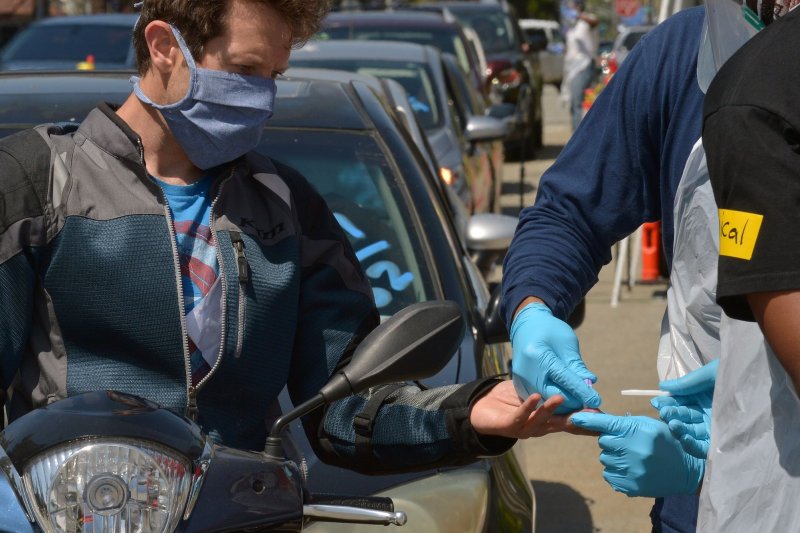Having COVID-19 antibodies protects against reinfection for at least three months, a new study has found. File Photo by Jim Ruymen/UPI |
License Photo
Feb. 24 (UPI) -- Prior COVID-19 infection provides immunity against the virus for at least three months in the vast majority of patients, a study published Wednesday by JAMA Internal Medicine found.
In the analysis of nearly 3.3 million people, fewer than 1% of those with antibodies -- cells created by the immune system to fight off infection -- had evidence of the virus in their system after 90 days or more, the data showed.
The findings support the idea that people whose immune systems already have produced antibodies in response to the virus are at decreased risk for future COVID-19 infection, researchers from the National Institutes of Health said.
"As expected from other small studies, prior infection provides protection, though maybe not complete, from subsequent infection," infectious disease specialist Dr. Donald Forthal told UPI.
Recovered patients have some level of protection "for at least the time period of this study, or about three months," said Forthal, chief of the division of infectious diseases at the University of California, Irvine, who was not part of the NIH research.
People infected with the coronavirus who recover have at least some protection against future reinfection because their immune systems already have produced antibodies against the virus, researchers have found.
How long this protection lasts remains unknown, however, and there have been cases of "reinfection," or instances in which patients get sick, recover and get infected a second time.
Still, researchers have been looking at how antibodies against the coronavirus collected from the blood of recovered patients or created in a lab and packaged as a drug can be used to treat infected people.
For this study, NIH researchers analyzed data on roughly 3.3 million patients screened for antibodies against COVID-19.
After their initial antibody screening, the participants were tested for the virus every 30 days over at least a 90-day period.
About 12%, or 380,000, of the patients in the study were positive for COVID-19 antibodies at the start of the study.
Of these, just over 11% were still positive for the virus 30 days later, suggesting that some of its cells remained in their systems.
After 31 to 60 days, this number fell to just under 3%, and it dropped even further, to 1.1%, between 61 and 90 days after recovery.
At 90 days or more, 0.3% of those who had tested positive for antibodies still had evidence of the virus.
Some of these may be cases of reinfection, while others may be "false positives," researchers said.
"Since this study only goes out 90 days, it doesn't go far in addressing [the duration of COVID-19 immunity]," Forthal said.
"However, it is consistent with other studies, suggesting immunity lasts at least for three months," he said.















